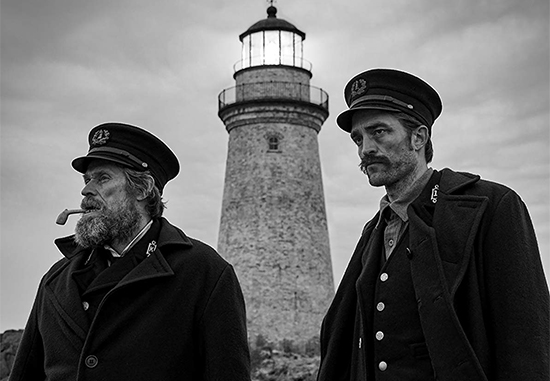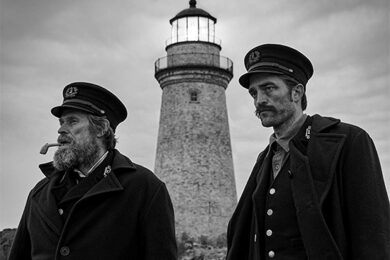There’s a moment in Robert Eggers’ The Lighthouse where Ephraim Winslow violently murders a seagull. He picks it up by the neck and repeatedly bashes it against a rock, while screams emanate from his throat and spit flies from his lips. In the moment, it almost feels comical; a cathartic and comedic break in the film’s palpable tension. But after the bird’s untimely demise, a sense of dread settles over Ephraim and The Lighthouse – he has just committed a crime. For in the eyes of mariners, it is bad luck to kill a seabird.
Superstition governs the lives of those at sea, which is reflected in recent horror releases, from The Lighthouse to Sea Fever to Harpoon. These strange beliefs, from never killing seabirds to not letting a redhead on board, give humans a sense of control over the elements. Superstition, and the rituals that often accompany it, offers a false sense of security. In these films, however, maritime superstition is used to build fear and foreshadow bad events to come. They each reflect an aquatic nihilism, where humans attempt to control the elements through caution and ritual, but ultimately succumb to the power of nature and the fallibility of human beings.
On the small, stormy rock in The Lighthouse, sea birds swarm and unleash their ungodly screeches at all hours of the day and night. These high-pitched howls pierce Ephraim’s brain and, accompanied by the drone of the foghorn, drive him mad. But, old Thomas warns that it is bad luck to kill these creatures. To do so would bring a curse to the entire island. Seabirds, specifically albatross, are thought to carry the souls of dead sailors, and are considered supernatural due to their ability to fly long distances. These two beliefs made sailors greatly respect them and treat them well, to ensure safe passage or good weather.
While at first Ephraim respects the old man’s wishes, the high-pitched cries split open his brain and unleash an animalistic anger. The scream of the seabird must be silenced by any means necessary – superstition be damned. But this is about more than Ephraim trying to quiet the seabird that seems to stalk him every day. It is a deliberate and charged rejection of his captain’s orders, trying to instead reclaim some form of agency over his small life. Every day he is forced to shovel coal, cut wood, and trudge through stormy weather as part of his assigned duties. With the death of the seabird, Ephraim makes a statement against what is expected of him as a tender of the lighthouse. As feathers fly, the duo’s false sense of security and their tenuous power dynamic is shattered. They have no choice but to confront the hellish reality upon their godforsaken island: they may never escape.
But superstition is not always about protection and good luck. Sometimes it offers a way to find someone to blame for misfortune on the high seas. Such is the case in Neasa Hardiman’s Sea Fever, a sci-fi film about aquatic monsters and what lies in the ocean’s depths. Her protagonist, scientist Siobhan, is seen as an object of fear due to her red hair. As soon as she joins the crew of a small fishing boat, they take one look at her and immediately want her removed from the ship; having her on board only increases their bad luck. In being able to dictate who can and cannot board the ship, the crew believes they can then exert some kind of control over their fate.
As soon as the captains let Siobhan stay on board, tension begins to build as bad things begin to happen on the ship. A massive creature pokes holes in the hull, and crew members are infected with a flesh-eating parasite. While this happens due to the naivete of one of their captains, the crew is quick to blame Siobhan instead. Rather than looking inward amongst their own ranks, they project onto the stranger, finding something more tangible than what could lurk beneath the waves. This grasping at metaphorical straws reveals humanity’s inability to exert any sort of control on nature.
While The Lighthouse takes place in the 19th century and Sea Fever is a film set in the present day, both rely on an overly cautious adherence to superstition, which speaks to the power of belief and the desire for any semblance of control over nature. Superstition offers an explanation to placate the minds of delicate sailors, but ultimately reveals the nihilism of the sea. And what could be more terrifying than that?
Then, there is the blatant violation of every known sailor superstition in just a few days, like in Rob Grant’s boat horror, Harpoon. Three friends, who actually despise each other, set out to sea for a day of drinking and fishing. As they run out of gas, tensions build and truths are revealed. In the process, they do everything you could possibly do wrong in the eyes of a sailor: there’s a redhead on board, they kill a seabird, there’s a woman on board, there’s someone named Jonah on board, and so on. But this is relayed by the narrator – the three have no idea what they’re doing. This blissful ignorance of superstition asks the question: is this happening because they’re doing everything wrong, or because they are just awful people? The narrator presents each superstition so matter-of-factly that they become a silly list of strange rules that seem absolutely unbelievable. The horror of the superstition is then stripped away, and replaced with the horror that human beings are capable of such vile behavior. While The Lighthouse and Sea Fever use superstitions as a way to create fear around their monsters, Harpoon makes them ridiculous to confront humanity’s own selfishness.
These three films speak to the power of superstition, and the desire to spit in the face of such arbitrary beliefs. Humans want control, either of the elements or of themselves; they never want to feel like they have lost their agency. No matter how many seabirds you save or redheads you shun, the horrors of the open sea will always win. But horror is all about loss of control, which is why these ancient fears feel applicable even now, where everything and everyone feels wrong. What it all comes down to is humanity’s own selfish desire for survival, and the violent ways we will try to ensure it. Perhaps now is the time for superstition, where we find our own ways to seize even a scrap of control. Perhaps this is why these horror films resonate with contemporary audiences. All we’re looking for is something else to blame.
The Lighthouse is out in UK cinemas now



